Most people find this hard to believe, but I have been a musician most of my life. It’s true, my skill level, such as it is, wouldn’t immediately indicate such a thing. But, in truth, I was a musician long before I ever learned how to play an instrument. I suppose that observation still remains mostly true today.
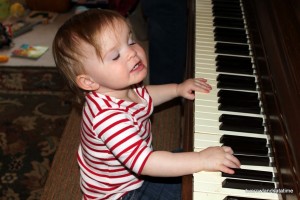 When I was young, I had a fascination for pianos. Whenever my family would visit a household that had one, I would immediately rush to it and not leave for the entire stay. Once seated at the keyboard, I would reverently press the notes, absorbing all the beautiful frequencies involved in the sounding of that single tone. Then I would press two-notes together. A chord. And I would positively swoon at the interplay of frequencies. I found it so overwhelming I would often begin crying at the sound.
When I was young, I had a fascination for pianos. Whenever my family would visit a household that had one, I would immediately rush to it and not leave for the entire stay. Once seated at the keyboard, I would reverently press the notes, absorbing all the beautiful frequencies involved in the sounding of that single tone. Then I would press two-notes together. A chord. And I would positively swoon at the interplay of frequencies. I found it so overwhelming I would often begin crying at the sound.
I was already composing music on the piano Grandma Polly gave us preceding their arrival, but it was probably the Beatles that inspired me to learn guitar. My sister had been taking lessons, as she had shown a distinct aptitude for the piano, before ours even arrived from our grandmother. But my sister was a classical music nut. She didn’t really like her piano teacher—who wanted to teach her to play chords and musical accompaniment to popular music in the jazz tradition.
So she quit taking her lessons after a few months. But I used her practice books to teach myself the basics of music theory: mostly centered around the construction of chords. I figured it out. I got it. When some family friends gave us a pretty decent homemade guitar, I started teaching myself chords by hunting down the individual notes on each string. This made for some chord fingerings never before seen on the planet. But I still use some of them when I play today.
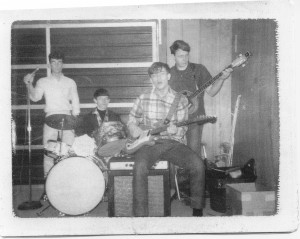 Eventually I learned somewhat how to play guitar in the manner of the day. By junior year in high school some friends and I formed a band—the Forgotten Few. We rehearsed more than we actually performed. I remember we played a few parties. And we tore up a smorgasboard at Wichita Grade School. The kids went crazy. Beyond that, we were generally forgotten by the few who heard us.
Eventually I learned somewhat how to play guitar in the manner of the day. By junior year in high school some friends and I formed a band—the Forgotten Few. We rehearsed more than we actually performed. I remember we played a few parties. And we tore up a smorgasboard at Wichita Grade School. The kids went crazy. Beyond that, we were generally forgotten by the few who heard us.
In college I fell in with Marv Ross and Lew Jones. We were three young singer songwriters, and I think we may have fancied ourselves as the next Crosby, Stills and Nash, except we all three wanted to be Neil Young. But beyond that, we were three pretty decent, young songwriters and we deserved to be heard. We played one memorable gig at the college in Mount Angel (which closed long ago).
Mount Angel is out in the foothills of the Cascades east of Salem. We borrowed Tom’s van to make the trip out there from Monmouth, where we were going to school. As fortification, we sat huddled in the back of the van and drank a substantial quantity of wine—and none among the three of us were really much in the way of drinkers. But, as things turned out, it was just as well.
We were a little keyed up for that performance—our first, ever. It was in the cafeteria or the Student Center, some dimly lit room of moderate size with claustrophobic ceilings and ominous curtains drawn tight as if to portend no flight. There was an audience of respectable size, maybe thirty or forty students, all sitting very quietly in folding chairs. We set up our gear in front of them as they stared at us without the slightest hint of expectation. Slightly drunk, we hurried to the back of the room where there was a table with cookies on plates and an enormous urn of coffee.
Grabbing cups of coffee, we stood at the back of the room for quite some time, apprehensively eyeing one another. The vibe in there was cheerlessly dreary. It hadn’t occurred to any of us to consider the fact that though Mount Angel College was a Fine Arts school, it was owned and operated by the Catholic Church, so it wasn’t exactly party central. Even still, we could not possibly have foreseen the doleful, woeful bunch we encountered there.
We were to play two forty-five minute sets. It was painfully obvious from the very start that dancing of any sort was of course out of the question. But it soon became clear that there would be no clapping of hands, nor tapping of feet, no nodding to the groove, no knowing glances of understanding, no smiles of appreciation. Nothing.
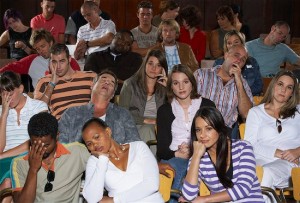 They simply sat there and stared at us. When we would finish playing a song, they would politely place their hands together, very softly, as if they were wearing kid gloves. If we played a song they knew, they clapped modestly louder. If we tried an original number on them (about two-thirds of our material), their response was kitten paws quiet. We’d play some heartfelt rockin’ little number, wrapping it up with a ringing G chord. Sepulchral pall.
They simply sat there and stared at us. When we would finish playing a song, they would politely place their hands together, very softly, as if they were wearing kid gloves. If we played a song they knew, they clapped modestly louder. If we tried an original number on them (about two-thirds of our material), their response was kitten paws quiet. We’d play some heartfelt rockin’ little number, wrapping it up with a ringing G chord. Sepulchral pall.
In retrospect, I’m reminded of something bass player Paul Kerouac once remarked at a Walkie Talkie gig ten years later: “Hey, I didn’t know dead people smoked!” Except these kids weren’t smoking. I’m not sure what they were doing, but whatever it was, it was not being entertained by us. I don’t remember packing up after we finally finished, or leaving the facility, only that we got the hell out of Mount Angel as fast as Tom’s van could haul us.
Six or seven years later, while I was still living in Dallas, Oregon, I formed a band with Roger, Roy and a couple of the Mikes from the fir cone dryer. We called ourselves Last Standing Tree. We rehearsed at Mike’s house, a squat, brick-red cottage that lay on some wooded acreage in the rolling green hills of the coast range, just outside of town off Ellendale Road.
We performed all over the mid-Willamette Valley, from Gates to Philomath, from Yamhill to Stayton, from McMinnville to Corvallis. We played every dive bar in the region that had music of any kind. Our specialty was a broad selection of Grateful Dead material, as well as a hearty assortment of country rock songs by artists such as the Eagles, Allman Brothers, Jackson Brown, Graham Parsons and JJ Cale. We also threw in an array of original songs, just to keep the audience at bay.
While we had a small coterie of friends and family who would generally attend our gigs close to home—like when we played the Blue Garden or the Shortstop Inn in Dallas, the Falls City Tavern, or the Cooler in Independence—most of the more distant events were staged before complete and not always completely satisfied strangers (a guy once offered us fifty bucks to quit playing, so he could shoot pool in peace). Still, we did have a fan base.
From playing various parties and other functions throughout greater Polk County, we acquired a bit of a reputation with the Gypsy Jokers motorcycle gang. The Jokers have been around since the ‘50s and are pretty much considered right up there with the Hell’s Angels as far as badassed motorcycle gangs go. The two gangs had turf wars back in the ‘60s down in the Bay area, which resulted in the Jokers moving up to Oregon (I guess we know who won). Numerous members lived out in the hills surrounding Dallas. They were spread all over the Willamette Valley.
One or two Jokers at a gig was usually fine. Everybody got along and the good times rolled. But more than about five or so and the mood would fill with menace and the air would pretty much leak out of any sort of party balloon we in the band were attempting to musically inflate. When a troop of those guys showed up, we generally took a break. But, for whatever reason (probably the Dead and other “outlaw” songs we played), the guys typically took a shine to us.
I don’t remember exactly what year it was, but it was fall, because it was beginning to grow chilly at night, threatening frost. One of the Mike’s, I’m not sure which one, scored us a gig playing at a Gypsy Jokers party out on the road to Monmouth. It was held outdoors in a big, wide-open field, next to an orchard.
Early one breezy afternoon, we drove a borrowed flat-bed truck down a long gravel driveway that divided two rows of apple trees and eventually led to an old, dilapidated yellow, two-story house. A guy named Tank greeted us. He could have been named “Truck” and no one would have argued. He had a leather red face, bushy brown beard and long, greasy hair combed back in deep furrows. He was in uniform: motorcycle boots, dirt-slicked jeans, t-shirt and grimy black leather vest, obligatory sleeveless Levi jacket sporting the familiar gang emblem of a skull wearing dark glasses on the back.
Tank told us to park in front of the house where we would use the truck bed for a stage. He hauled a couple of power cords out to us and we began setting up. A couple of bikers and their chicks ambled by from time to time and we would stop what we were doing to chat with them. One of the guys, kind of a hippie-looking dude in Jokers regalia, very neat and clean, with wire-rimmed glasses, a beaded headband and long straight blond hair, happened to mention he had a degree in engineering from MIT. One never knew with those guys. They were rebels.
We went on as scheduled at around three. It was to be five sets of rock and roll entertainment. We were to play until dark, around seven or eight or clock for a fee of five hundred dollars! We began playing to a modestly responsive crowd—pretty laid-back. They lay in tribal clumps out in the field in front of us, drinking and smoking weed, grooving on the Dead songs especially.
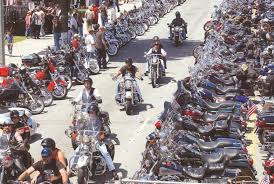 Parked motorcycles encircled a large, faded pink outbuilding, about fifty yards to our left on the east side of the property. An enormous amount of smoke steadily streamed from the open shed windows and periodically loud shouts and booming laughter would erupt. Bikers and their chicks randomly stumbled in and out of the building, eventually wandering toward the house behind us or to a familial cluster in the listening audience.
Parked motorcycles encircled a large, faded pink outbuilding, about fifty yards to our left on the east side of the property. An enormous amount of smoke steadily streamed from the open shed windows and periodically loud shouts and booming laughter would erupt. Bikers and their chicks randomly stumbled in and out of the building, eventually wandering toward the house behind us or to a familial cluster in the listening audience.
As the day digressed into evening, our spectators began gradually to disappear from our view. There were a few campfires out in the field and one over near the outbuilding. We could see shadows maneuvering in the twilight, but responses to the conclusions of our songs dwindled to occasional faint biker chick hoots and monosyllabic biker roars.
Eight o’clock rolled around and we finished our final set. Thank you very much, Gypsy Jokers and goodnight now y’all. However the Jokers weren’t quite ready for us to call it a night just yet, so someone somewhere sent forth an emissary to urge us to soldier on and continue to play into the night. A veiled sense of menace hung over the request. He scrounged up a couple of clamp on work lights, thus we were able to see what we were doing. So we played our first set over again and tried to leave. Another agent arrived imploring us to continue playing for the betterment of all mankind. So we played our second set over again.
As might have been expected, we began our second pass through our fifth set sometime after midnight. It was downright cold, our frosty breath fogged the night around us. It appeared to us that no one was even out there, we could discern no movement or sound. But every time we tried to quit a voice would gruffly bellow out from the darkness: “Keep playing!” Twice, shots were fired.
It was after one-thirty when we concluded our fifth set for the second time. We knew we had to come up with a plan or we might never be able to escape from that place. It was entirely possible that the Gypsy Jokers were intent on kidnapping our band and making us their music slaves— doomed to play “Me and My Uncle” five times a night into eternity. Out of desperation we arrived at a strategy.
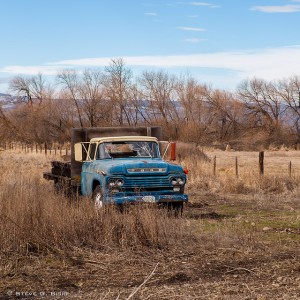 We launched into our “encore,” “I Know You Rider” for the second time. Our scheme was to slowly pack up our gear as we played, each of us taking extended solos—finishing with the drums. As each member would finish his solo, he would put away his guitar, batten down his amp and hide in the cab of the flatbed.
We launched into our “encore,” “I Know You Rider” for the second time. Our scheme was to slowly pack up our gear as we played, each of us taking extended solos—finishing with the drums. As each member would finish his solo, he would put away his guitar, batten down his amp and hide in the cab of the flatbed.
While Roger was executing a drum solo of extreme anxiety, a couple of the braver among us stayed behind on the flatbed to furtively pack up and fastly secure his drums and cymbals while he played. Finally, he was just down to his snare drum and stand. As Mike grabbed the drum stand and throne, Roger kept beating furiously on the snare as if his life depended on it.
Once everything was packed up, Roger jumped into the crowded cab, snare drum clutched tightly under his arm. Roy fired up the truck, swerved into reverse, turned, and hit the gas, spraying gravel as the wheels spun. We sped out of there as fast as we could go, the sounds of gunshots ringing through the apple trees. We never got paid for that gig.
II
Another six or seven years later, Walkie Talkie, the band I had originally formed with second wife Hilda, had reached the end of its tenure as staunch purveyors of original music to crowds of tens. Acting on Hilda’s consistently self-serving counsel, we embarked upon a new, wondrous career as a lounge band—the object being to forego all dreams of finding success in the music industry in order to make a living in it.
One thing for any aspiring rock musician to remember is: “if music is your job, you are not playing.” Many rock musicians attempt to avoid this reality. That’s why they booze it up and take drugs and do other self-destructive things.
Back then being in a Top Forty “lounge band” was probably the lowest rung on the rock and roll ladder. The human jukebox. There was no musical creativity in a lounge band. The creativity came in stagecraft—lighting and dress: the package. The presentation. That’s where the best stood out from the rest. Sounding exactly like the band they covered was the next requisite. If you were going to be doing “Billy Jean,” you damn well better sound like Michael Jackson. Whoo!
Four sets a night, six nights a week. The good ones played the Red Lion circuit. Red Lion’s paid top dollar—as much as a thousand dollars a night, or more. I can’t remember who booked the Red Lions. It was a woman and she had bleach blond hair. At that time the circuit consisted of six or seven locations between Vancouver and Salem. So a band could play a week or two at one location and not return for another couple months.
We certainly weren’t one of those bands. The industry was hierarchical and tiered to conform to band ability and the needs of the dive that was requiring music on a nightly basis. Andy Gilbert and his minions at Pacific Talent governed the best rooms, booking more than half of all the music clubs in town. Pacific Talent is still around. They still book the best bands to events and fairs and the like.
We weren’t one of their bands either. We hooked up with the Tom Stinnette Agency. I don’t remember ever meeting old Tom. A young woman named Carmen was our liaison. She was very nice—a vivacious redhead who seemed to strike up some sort of bond with Hilda. Carmen did a good job of keeping us moderately busy, though most of the gigs paid only a fraction of what the others were receiving with the better agencies.
But we were kind of a tough band to book. We really only wanted to play Top Forty music we could tolerate, like Scandal’s “Goodbye To You,” the Cars’ “Shake It Up,” “Burning Down the House,” and “Safety Dance,” but circumstances compelled us to learn “Beat It,” “Every Breath You Take,” and “Flashdance.” I, for one was humiliated. But dollars had to be made.
One of the many, many places Carmen booked us was into the Holiday Inn in Wilsonville. That particular Holiday Inn still looks as if it were built during the Russian Constructivist era. It’s an austere building that sits off the I-5 Freeway out in the middle of nowhere—near Wilsonville, if that’s actually a real place. We played there on several occasions. In fact they had a room for the band before the gigs and during breaks. That was a touch of class to which we were unaccustomed.
One Saturday night as we arrived to play, Len the head bartender had a very worried look on his face. It seemed that a tribe of gypsies had booked the entire hotel for some sort of a convention and they were running rampant around the grounds, causing all kinds of mayhem, stealing sheets and towels, and anything that wasn’t bolted down. Actually two TVs were missing, even though they had been bolted down. The hotel manager kept appearing and disappearing again, with a look of sheer terror on his cloud-white face. He clearly was in over his head.
There were a lot of gypsies in Portland when I was growing up. Many lived in tenement rooms and apartments in buildings in Old Town near the Chinese district. On Sundays, the gypsy women would break out their most colorful skirts and scarves and would stand out on the sidewalk talking and laughing, as the kids played out in the street.
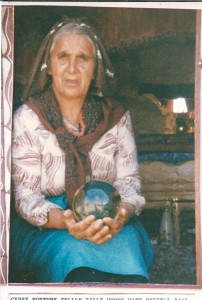 And there were several gypsy businesses along Southeast 82nd Avenue in some of the neighborhoods I navigated by bike with my buddies in junior high school. Most of the businesses were fortune telling and palm reading ventures. But there were also gypsy hairdressers and auto repair enterprises. A few gypsy kids went to my junior high school. They kept to themselves, but were nice enough. There wasn’t any social stigma or anything.
And there were several gypsy businesses along Southeast 82nd Avenue in some of the neighborhoods I navigated by bike with my buddies in junior high school. Most of the businesses were fortune telling and palm reading ventures. But there were also gypsy hairdressers and auto repair enterprises. A few gypsy kids went to my junior high school. They kept to themselves, but were nice enough. There wasn’t any social stigma or anything.
So the prospect of a bunch of gypsies overrunning the Holiday Inn did not daunt me nearly to the extent it seemed to trouble the help. They were all frantic. The staff was scrambling around picking up ashtrays or anything loose that could be pocketed. The smell of fear was palpable around the place. For their part, a sizeable clan of gypsies gathered in the bar for the entertainment. They seemed passive enough. They laughed boisterously and smoked with an enthusiastic eastern European intensity not often witnessed in this region.
We had been playing the room since Thursday, so we were already set up to perform when we came down from the “green room.” The bar was a madhouse as we entered. There were crazy gypsies everywhere, partying with an enthusiasm worthy of, well…. crazy gypsies. We’d never played for gypsies before, so we weren’t exactly sure what to play for them.
Allen remembers their hair as orange, but I remember the gypsy women’s hair as being an uniformly cranberry tint with blood orange highlights. Many of the women wore brightly-colored scarves and most wore ornate golden earrings. They would chatter and laugh, relentlessly scanning the room with nervous apprehension.
All the men sat together, smoking profusely, an ominous grey cloud hovering above them, threatening nicotine rain. Most of them wore moustaches, with heads of thick, black hair slicked back stiff. The popular fashion statement for the gentleman gypsy of the day was the plunging neckline. White shirts predominated. Some of the more adventurous among them wore white shirts with vertical stripes. Bejeweled rings and strands of gold chains seemed requisite.
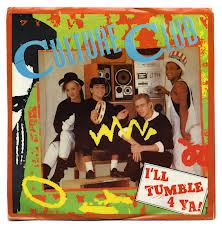 We kicked off the evening with Culture Club’s “I’ll Tumble 4 Ya,” at the conclusion of which there was no discernable decline in the gypsy din. “Flashdance” seemed to raise a vague stir. “Der Kommisar” and “Should I Stay or Should I Go” went nowhere. We worked our way through the first set, but could not seem to catch the attention of our gypsy audience. Finishing up with “Mickey,” to no avail, we trudged from the stage and made our way back to the green room. It was going to be a long night.
We kicked off the evening with Culture Club’s “I’ll Tumble 4 Ya,” at the conclusion of which there was no discernable decline in the gypsy din. “Flashdance” seemed to raise a vague stir. “Der Kommisar” and “Should I Stay or Should I Go” went nowhere. We worked our way through the first set, but could not seem to catch the attention of our gypsy audience. Finishing up with “Mickey,” to no avail, we trudged from the stage and made our way back to the green room. It was going to be a long night.
We came back for the second set, determined to win their gypsy hearts with Loverboy, Hall and Oates, Prince, Duran Duran. The hits baby! We were pulling out all the stops. As I stepped to the mic to sing “Workin’ For a Livin’,” a wide, burly man in a white shirt, unbuttoned to the navel, with lots of gold chains draped around his chest, was standing below me with the urgent look of a worried gypsy king on his face. And, from what he said anyway, he actually was a worried gypsy king. Or king of his tribe, or clan—I never got their line of ascendancy straight. But he was worried. And he was the head guy. That much we had straight.
It seemed that his subjects were complaining. And, don’t you know, unhappy subjects make for an unhappy gypsy king. So he was unhappy. He had a request. We were familiar with musical requests. Most of the time we couldn’t fulfill them, because believe it or not, most musicians are not human jukeboxes. We did, however, eventually learn “Freebird” and a Journey song, which cut down on our request failures by about fifty percent.
But on that particular night the king of the gypsies was making a request I had never had posed before. Could we play some Kenny Rogers? Kenny Rogers? The incongruity of the request skewed my reality for an instant. Kenny Rogers? No one had ever requested Kenny Rogers before. I was certain I didn’t know any Kenny Rogers songs—I couldn’t even think of any! A couple other band members were familiar with some of his material, but none of them knew how to play any of it. No Kenny Rogers.
No Kenny Rogers? Very bad. Very bad. The king drifted off, none too happy with our exchange. We set about trying to fire up the gypsies with Huey Lewis and the News, Naked Eyes, Men at Work, David Bowie, the Pretenders. We gave them everything we had, met only with icy stares and reproachful glares. We were in trouble. We still had half the night to go.
At the end of the set, before we could evacuate the scaffold, the gypsy king was again standing at the foot of the stage, a look of expectant impatience on his face. He wanted to know if he could use my guitar and play some Kenny Rogers songs. One rule of band is: Never give up your instrument. Guard your instrument at all cost. I said sure.
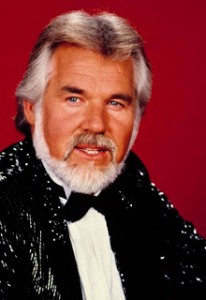 The guy proceeded to play the entire Kenny Rogers songbook. All the hits, all the B-Sides. After a while Chris the drummer and Larry the bass player jumped in to back him up. Allen might have played lead guitar on some songs. Hilda got up and sang on the duets. I just sat and got smashed on gin and tonic, as the gypsy king sailed through the early gold like “Ruby,” “Lucille” and “The Gambler” before moving on to the latter-day stuff such as “Islands in the Stream,” “Lady,” and “She Believes in Me.”
The guy proceeded to play the entire Kenny Rogers songbook. All the hits, all the B-Sides. After a while Chris the drummer and Larry the bass player jumped in to back him up. Allen might have played lead guitar on some songs. Hilda got up and sang on the duets. I just sat and got smashed on gin and tonic, as the gypsy king sailed through the early gold like “Ruby,” “Lucille” and “The Gambler” before moving on to the latter-day stuff such as “Islands in the Stream,” “Lady,” and “She Believes in Me.”
His subjects were overswept with rapturous joy. The moment he started strumming my guitar, they all flocked to the dancefloor as if a sign were flashing above the stage. Suddenly everyone was laughing and grooving to “Through the Years” and all the others. All was well with the gypsies. Their king was singing Kenny Rogers.
III
It was at the end of a bleak October, only a year or two later. Hilda and I were in the throes of finalizing a dreary divorce from our miserably ill-starred marriage/business relationship. It was a generally depressing time. I was disconsolate, with not a lot going on in my life at the time. My relationship was gone, thus my band was gone, thus my job was gone. It was a dark time.
Former college bandmate and ever the faithful friend, Lew, was on persistent lookout for anything for me to do that might help to bring me out of my funk, even if it was only for a few days. A distraction. A shiny object. And there were a few projects he came by that did offer some temporary refuge from my inconsolability. And while one event may have ultimately had the opposite effect, it remains vividly memorable in my mind some thirty years later.
Lew asked if I wanted to play for a funeral. Given my mood, a funeral seemed strangely appropriate to my own grief-stricken state of being, so I agreed to join in the fun. Perhaps I could bury my own dead things. He also brought in two brass guys whose names I don’t remember, but we’ll call them Rob and Don, because those names are representative for horn players. We rehearsed a few times. But how often do you need to rehearse for a funeral? Besides, the gypsies had only requested four songs.
Wait, wait, wait. Gypsies? Yeah, I don’t know how he did it either, but somehow Lew hooked us up with playing at a gypsy funeral. Having had some recent experience with the tribe, I felt inclined to remark about my trepidations over the outcome of the undertaking, especially as we didn’t know any Kenny Rogers material. But Lew was certain all would be well. His contact with the gypsies had been amicable and straight-forward. He understood what they wanted from us. We were going to be paid one hundred and twenty-five dollars each for a couple of hours of our time. Okay then. No problem.
We were to meet the fellow who hired us at the Pine Street Theater where old Mrs. Bihari was lying in state. From there we were to march with the procession over to Saint Francis church, maybe six blocks away, where the service was to be performed. That seemed simple enough.
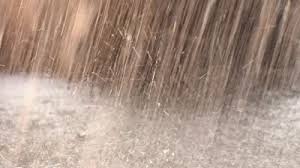 We arrived at the Pine Street Theater in the midst of a remorseless drenching downpour. Waiting in the foyer for our envoy to appear, we could see in the main hall the old gal dressed in a white nightgown, spread out on a queen bed bedecked with white silk sheets, looking very angelic and quite dead. She was surrounded by weeping women, all with heads covered by dark scarves. Behind them stood the men, motionless, staring blankly at a spot in space about eight feet above the scene.
We arrived at the Pine Street Theater in the midst of a remorseless drenching downpour. Waiting in the foyer for our envoy to appear, we could see in the main hall the old gal dressed in a white nightgown, spread out on a queen bed bedecked with white silk sheets, looking very angelic and quite dead. She was surrounded by weeping women, all with heads covered by dark scarves. Behind them stood the men, motionless, staring blankly at a spot in space about eight feet above the scene.
Our guide, Zindelo eventually appeared, looking very haggard. He was quite dark-complected, taller and more slender than most of the other men, with night black hair and moustache. He wore black slacks, a white oxford shirt with blue pinstripes and a black nylon flight jacket. He motioned us outside and promptly lit up a cigarette, puffing it profusely. He described for us in detail the sequence of events that would get us over to the service at the church. Our only real responsibility was to play a dirge on the trip over. We assured him that would be no problem. All I had to do was play an E minor chord on my guitar. I could handle that. The pressing problem was that it was pouring down rain.
At some point people began to gather in the vestibule. We stood in the doorway a guitar and horn at each side, and began to play Chopin’s gloomy funeral march. Over and over and over. If you think of that piece to yourself, you only make it through a time or two before you veer off the road of consciousness and lose interest entirely. There are actually a lot of pretty parts in Chopin’s piece but we didn’t play any of those.
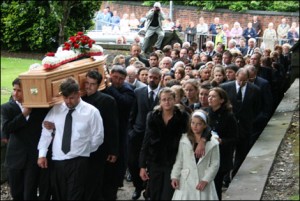 The crowd at the entrance stirred and parted as six hefty men came forth bearing on their shoulders Mrs. Bihari in her bed. Zindelo gave us the nod and we walked out into the deluge, droning the death march. We didn’t make it to the corner of 9th and Sandy, maybe one hundred feet, before we were all soaked to the bone, including Mrs. Bihari who really did seem to be the most serene about the conditions—perched smartly above us all as we trudged inexorably up the hill through the onrushing creek toward the church. Born by water, borne through water.
The crowd at the entrance stirred and parted as six hefty men came forth bearing on their shoulders Mrs. Bihari in her bed. Zindelo gave us the nod and we walked out into the deluge, droning the death march. We didn’t make it to the corner of 9th and Sandy, maybe one hundred feet, before we were all soaked to the bone, including Mrs. Bihari who really did seem to be the most serene about the conditions—perched smartly above us all as we trudged inexorably up the hill through the onrushing creek toward the church. Born by water, borne through water.
When we finally made it to the small church we members of the band were forbidden from going inside to dry off. We stood out on the loggia with a dozen or so of the men as they chain-smoked with religiously aggressive fervor. It’s my recollection all of the men looked alike, possibly all from the same family: dark haired, some with moustaches, others not. They were all dressed like Zindelo, wearing white shirts, black slacks and the same black nylon jackets with jaunty military epaulets.
While smoking ferociously, the men also gorged on chocolate—primarily Hershey bars. Suddenly, as if by some signal, seemingly every one of them produced a bottle of Chivas Regal and began guzzling with alarming gusto. As time passed, each guy would saunter over to us and offer us his bottle. Drink! At first we politely refused. Shit, things were already weird enough! But Zindelo quickly hustled over, informing us that refusing to drink a gypsy’s Chivas Regal at a funeral is blatantly disrespectful. So we drank. And drank. Jesus, did we drink.
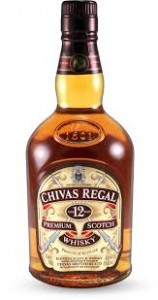 I don’t remember how long the service was. I don’t remember how long it kept raining. Although I know we did fulfill our bargain and play “Golden Earings” as they wheeled Mrs. Bihari out of the church in her shiny mahogany casket. After that I lost track of Lew and Rob and Don. I think I pretty much blacked out. I know from the hangover I experienced the next day that I probably approached alcohol toxicity levels. It was one of my lifetime epic drunks, ranking right up there with the Decriminalization Party of 1973.
I don’t remember how long the service was. I don’t remember how long it kept raining. Although I know we did fulfill our bargain and play “Golden Earings” as they wheeled Mrs. Bihari out of the church in her shiny mahogany casket. After that I lost track of Lew and Rob and Don. I think I pretty much blacked out. I know from the hangover I experienced the next day that I probably approached alcohol toxicity levels. It was one of my lifetime epic drunks, ranking right up there with the Decriminalization Party of 1973.
I think Lew drove. I hope I didn’t. Anyway, somehow we ended up about ten miles away at the Rose City Cemetary up on Northeast Fremont. As we made our way down the puddled asphalt toward the burial plot, the sun broke cheerily from behind the clouds. It shone brightly on a party of thirty or forty sobbing women of all ages and maybe thirty stern men who, among other things, clearly did not want to be there. It was a packed house.
Lid closed, the shining, ornately carved wooden casket was perched above the final resting place, and the crowd gathered close to hear the priest recite the final prayer. It was a touching moment. I haven’t been to a lot of funerals in my life. It was a very nice ceremony.
The priest concluded his duties and walked away from the grave. The gathering of people closed in tightly around three attendants as they began to slowly lower the casket into the ground. In an instant there were Chivas bottles anew everywhere, and everyone—men, women and children—poured the booze on the box as it was going down. In addition currency began descending into the grave, mostly twenties, but there were larger denominations, being strewn indiscriminately, falling like rain into the void.
Zindello appeared from somewhere, signalling us to play the final song of our set. And so with the sun shining brightly on that wet October day, as poor Mrs. Bihari was slowly lowered to her final rest, Rob and Don raised their gleaming horns heaven high to accompany Lew and me as we banged our guitars and, as requested, belted out a spirited version of “This Land is Your Land.” The attendants dutifully retrieved their ropes and began shoveling dirt into the grave as we continued singing the song over and over again until all the mourners left the site.
********************************************************************************************************************
Have you written a book? Wanna pitch it to a literary agent or publisher? For God’s sakes learn to write a proper query letter. Learn to boil your book down to a couple hundred choice words. But make it exciting. Make the jaded reader of your query want to read the book. Seems easy enough, eh? Try describing your favorite book in 200 words that somehow conveys the impact as well as the story. Maybe you’d like to start with the Bible.
The Bible X
God said to Noah
You should build yourself an ark.
It’s gonna get wet.

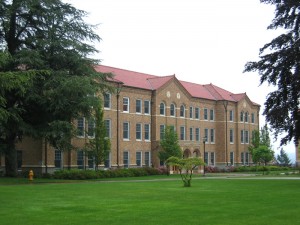
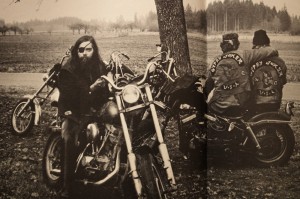

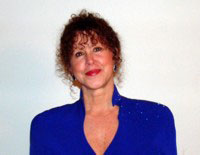

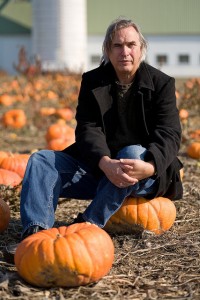
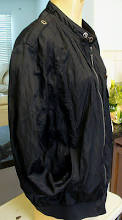
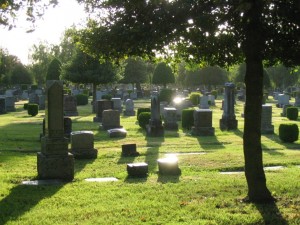
Shocked to hear Kenny Rogers!